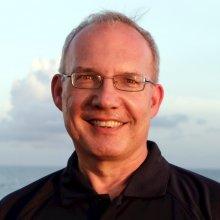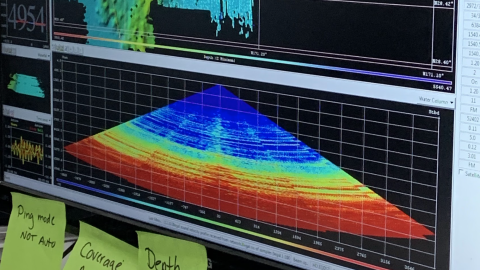
Emil Petruncio
Tell us about your work/research. What kind of things do you do?
I am a retired naval officer and enjoy teaching oceanography at Anne Arundel Community College and coaching fencing at the U.S. Naval Academy. As a naval oceanographer, I gained experience in providing meteorological and oceanographic support for a variety of operations, and as a military professor devoted my final 12 years of active duty to teaching oceanography at the Naval Academy. My doctoral research involved observation and modeling of internal waves generated by ocean tides. These waves are an important source of mixing in the vicinity of mid-ocean ridges, seamounts, and submarine canyons, and can affect the safety of subsurface navigation. I also have an interest in tidal and non-tidal water level variations and am working with colleagues at the Naval Academy to develop plans for adapting to sea level rise in the decades ahead.
What sparked your initial interest in your career?
My interest in oceanography developed through family vacations to the New Jersey shore. I was (and remain) fascinated by the immensity of the ocean, the secrets that lie beneath the surface, and the power of ocean waves. When I participated in the Naval Academy Summer Seminar as a rising high school senior and learned that there was a career field in the Navy for oceanographers, my career goals started to take shape.
Who influenced you or encouraged you the most?
I am fortunate to have had dedicated, talented teachers from grade school through postgraduate school, and several great mentors and role models during my naval career. Commander Fred Zeile, my boss while I was stationed in Keflavik, Iceland, encouraged me to pursue a doctorate and was a great mentor and friend through the years. Professors Gene Haderlie, Jeff Paduan, Chuck Wash, Leslie Rosenfeld, Bob Haney, and Ed Thornton were major influences at the Naval Postgraduate School. Vice Admiral Paul Gaffney (Retired) has been an inspiration since I served on his staff in the late 90s. Since becoming involved with ocean exploration in 2013, I have been motivated by the enthusiasm, dedication, and expertise of Dr. Ballard, Professor Larry Mayer, Mr. Jesse Ausubel, the excellent staff members of the Ocean Exploration Trust, and the shipmates with whom I have worked aboard E/V Nautilus.
What element of your work/study do you think is the most fascinating?
I'm fascinated by the whole process of using ROVs to explore the seafloor - working with navigators and sonar experts to gather the mapping data, coordinating with GIS experts and lead scientists to analyze the data and select promising routes for ROV exploration, and then working with the whole science team and the bridge watch to send the vehicles down to explore and sample the biology, chemistry, and geology of deep sea habitats.
What other jobs led you to your current career?
Early in my Navy career, I gained experience in navigation, time management, and teamwork at sea through my service as a Surface Warfare Officer. As a naval oceanographer, I gained experience in conducting field measurements at sea, operational forecasting, and professional communication (oral and written) - all of these skill sets prepared me well for my assignments on E/V Nautilus.
What are your degrees and certifications?
Bachelor of Science in Oceanography - U.S. Naval Academy 1985; Master of Science in Meteorology and Physical Oceanography - Naval Postgraduate School 1993; Ph.D. in Physical Oceanography - Naval Postgraduate School 1996; Master of Science in National Security Strategy - National War College 2002.
What are your hobbies?
I'm gaining experience as a photographer and digital artist, and have had several works accepted in national exhibitions hosted by the Maryland Federation of Art. I also enjoy playing the piano for my greatest fans - my wife and our dogs.
What advice would you give someone who wants to have a career like yours?
In your student years, be patient as you acquire the basic skill sets that are necessary to excel in any of the sciences, and then practice putting those skill sets together to explore and master your field. In oceanography, learn about each of the subdisciplines - biological, geological, chemical, and physical oceanography - because each of those knowledge areas informs the way we conduct exploration and hypothesis-driven ocean research. Take every opportunity to advance your learning in the classroom and at sea, and gain practical experience in applying your knowledge. Along the way, respect the experience and advice of your parents, teachers, and other mentors who offer you help. Bloom where you're planted, but be open to new experiences and course changes.
How did you get involved with the Nautilus Exploration Program? How did you get on the ship?
Dr. Ballard reached out to the Naval Academy, via the Office of Naval Research, to see if officers and midshipmen would be available to help as navigators. I'm certainly glad for that connection.
I am thrilled to be taking part in another season of deep ocean exploration aboard Nautilus. I enjoy the teamwork involved in mapping the depths, investigating deep sea habitats, and sharing amazing discoveries with Nautilus Live viewers around the world.
Expeditions
Emil participated in the following Ocean Exploration Trust expeditions:

